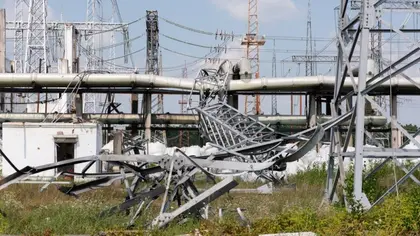In the wake of Russian strikes on critical elements of Ukraine’s electricity infrastructure, the nation faces the immediate challenge of keeping the lights on for its citizens, businesses and defence efforts — yet must also consider how to reconstruct its electricity system and make it more resilient.
Monika Morawiecka is a Senior Advisor with the Regulatory Assistance Project (RAP)
JOIN US ON TELEGRAM
Follow our coverage of the war on the @Kyivpost_official.
There seems to be a strong consensus within Ukraine that this future electricity system will be a sustainable one. As the country moves closer to joining the EU, European requirements and energy and climate policies are providing clear guidelines for the future Ukrainian energy system.
Despite the war, the Ukrainian government has kept its climate ambition and, in May 2023, adopted the 2050 Energy Strategy of Ukraine, which envisages a carbon-neutral energy sector by 2050.
The imperative for Ukraine to decarbonise and decentralise its power system has never been more apparent. With the declining costs of renewable energy sources, the benefits of resilience and enhanced security of supply, as well as the pressing need for European integration, Ukraine has an opportunity to pursue a sustainable and affordable road towards decarbonisation.
Analysing decarbonisation pathways
A recent study offers valuable insights into long-term decarbonisation scenarios for Ukraine’s power system. The study confirms that decarbonising the Ukrainian power sector before 2050 is feasible, both technically and economically.

EXPLAINED: What We Know About Russia’s Oreshnik Missile Fired on Ukraine
The transition to net zero is achievable without new nuclear reactors, highlighting the competitiveness of renewables in the current market. The results also confirm that rapid coal phase-out by 2030 is also possible without endangering security of supply.
Economic implications
The transition to a decarbonised power sector entails significant capital investments, particularly in renewable energy infrastructure. While this presents challenges, the resulting reduction in fuel and CO2 costs largely offsets these expenses.
Indeed, the study concludes that the total system cost of the decarbonisation scenarios is nearly identical to the business-as-usual scenario.
What is also true, however, is that transitioning towards decarbonisation may lead to higher electricity prices in the short term, impacting consumers. To mitigate this effect, well-designed support schemes targeting vulnerable consumers are essential.
Additionally, promoting energy efficiency measures during the reconstruction phase can alleviate the burden on consumers by reducing energy consumption and thus total bills, even if unit costs will be higher.
Challenges
The journey ahead is fraught with challenges. The scale of the task is immense. Investment will be needed not only in new generation facilities, but also for upgrading and expanding the grids. Competing investment priorities, including commitments to keeping power prices low for consumers, threaten to stretch resources thin.
Against this backdrop, it is critical that Ukraine adopts a strategic and prudent approach, guided by principles that prioritise least-cost, highest-benefit, and lowest-risk pathways to decarbonisation. Crucially, mobilising private capital to rebuild energy infrastructure will be indispensable, as public funds and donor contributions alone will not suffice.
The need to attract private investment underscores the importance of a supportive regulatory environment. Depending on future global security arrangements, the basic country risk might remain relatively elevated, causing investors to demand high risk premiums on employed capital. It is therefore key to lower the regulatory risk that is firmly under the control of the Ukrainian government.
Guiding principles for regulation
The circumstances in Ukraine call for a set of guiding principles for decarbonisation, centring around transparency, public participation, effective communication, equity, and strengthening institutions, in particular the energy regulatory body and the consumer protection office.
Transparency is vital in building public trust and attracting private investment, while public participation fosters inclusivity and ownership of the transition process, especially in light of likely future electricity price increases.
Effective communication is paramount for garnering the support and confidence of both investors and consumers, while equity considerations ensure that the burdens and benefits of decarbonisation are distributed fairly.
Strong institutions are essential for providing a level playing field for investors, who can trust that their economic interests will be given due consideration.
Prudent approach to support renewables
The deployment of renewables can be best facilitated by de-risking investments, streamlining permitting processes and enhancing grid infrastructure. For utility-scale renewable investments, a market-driven support scheme, such as a two-sided contract for difference, will strike the right balance between providing investors with enough revenue predictability to finance their projects, while protecting consumers from undue costs.
This is particularly important as Ukraine still grapples with the aftermath of past misguided renewable support policies, when over-generous feed-in tariffs were under-funded for the fear of over-burdening electricity bills.
By the same token, it is important that support of prosumer investments in rooftop solar follows the principles of fairness and proportionality. While distributed prosumer generation is important for household-level resilience and sense of security, care must be taken to avoid increasing the cost burden for non-prosumer customers and to maintain incentives for demand-side flexibility.
Working together towards a resilient energy system
Implementing these recommendations will require concerted efforts from the government, private investors, local governments and communities, with strong support from the European Union and the wider international community.
By prioritising regulatory clarity, prudent investment incentives, and by applying international best practices, Ukraine can and will navigate its energy transition to a sustainable and resilient future.
You can also highlight the text and press Ctrl + Enter






